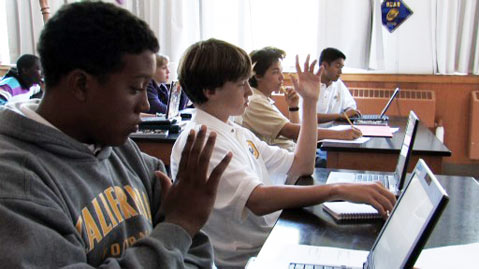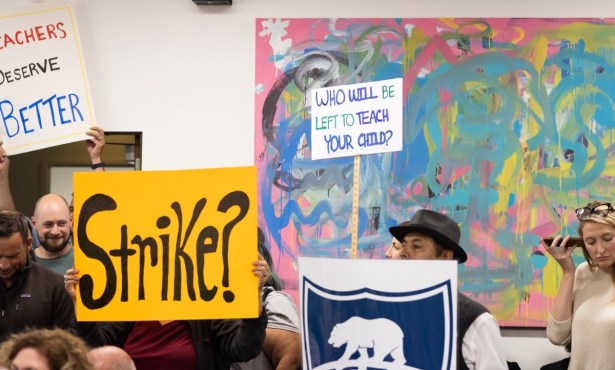Kids Cash In Childhood in “The Race to Nowhere”
Is Your Student Hard-Working Or Dangerously Overworked?

In our success-obsessed society, school sometimes seems to have less to do with learning than with competition between peers—a system that is doing catastrophic damage to kids’ psychological and physical health. Race to Nowhere, a documentary that premiered in 2009 and continues to tour America, challenges the accepted method of education and aims to expose the true effect of academic pressures on today’s youth. The film features students who are cracking under the pressures of modern-day academia, teachers who have their hands tied by school policy, and parents who are trying to do what’s best for their kids.
Race to Nowhere has begun a movement fighting to change education. Endtherace.org, which includes links to groups nationwide, discussion boards, and resources for people wishing to join the movement, is offering an opportunity for students, educators, and parents to make a difference. Leaders of the movement will publish a book to serve as a solutions-based road map for far-reaching cultural and educational change. The book will include true stories, suggestions, and opinions (all of which can be submitted on the Web site).
Issues in the film hit closer to home than many would expect. They reveal that our “laid back” city is anything but exempt from the consequences of a cutthroat educational system. “All-nighters” are commonplace in high schools and even junior highs, and studies have shown that cheating is on the rise. The kids that look perfect on the outside are often the same kids who suffer the most psychological and physical damage. But why must even young children suffer from crippling stress? When will we begin to refer to “hard-working” as “over-working”?
The documentary contends that the heart of today’s academic flaws lies in the system put forth by the government. In a world where only tests and grades are relevant, critical thinking and individual ideas are squashed. “Even in critically analyzing a book, there is a right and wrong answer,” explained a Dos Pueblos High School senior. “They are teaching everybody to think alike.” Members of the End the Race movement assert that today’s educational system is training a generation of cookie-cutter kids who will be unable to truly succeed post-education because they will lack the independent thinking skills required of most jobs.
According to the film, students’ determination to fit the mold is sent into overdrive when they are assigned hours upon hours of homework. This forces them to push aside self-selected, enjoyable pastimes. An 11-year-old girl in the film confessed to secretly rising in the middle of night to do work because she was terrified that her teacher would get mad at her.
The overlooked truth, explained anti-homework activist and advisor to the film, Sara Bennett, is that “Homework is not going to make your kid smarter.” In fact, the countries that out-perform us on tests assign fewer hours of work. Furthermore, elementary schools show little to no correlation between amount of homework and performance levels, and high schools show only a slight correlation.
One high school experimented by cutting the amount of homework in half. The result was higher AP scores. Yet, teachers continue current patterns of heavy workloads because that is what they are expected to do. There isn’t room for teachers to be experimental when their jobs are on the line. “Our bonus money was based on our test scores,” explained high school teacher Susan Kaplan in the film. “If kids from your class test high, you get a bonus. So teachers push,” she said.
This system has proved to be detrimental especially to younger students. One San Marcos High School sophomore shared an incident from elementary school in which the teacher would not allow the class to go to lunch until he could explain the difference between the words “worse” and “worst.” “He made me look it up in the dictionary,” he laughed. “It was so embarrassing.”
As kids grow older, they come to fear stressful moments like this one, and most will do anything to avoid them. More and more commonly, avoidance includes cheating, a tactic kids turn to because of stress and the pressure to succeed. Although it remains more prevalent in colleges, the Adderall fad has spread to high schools. An 11th grader in the film shared, “Adderall … made me feel focused and better. Like ‘Look, I can keep up now.’”
Kids are stuck in the mindset that being anything but an “A” student means failure, inadequacy, and a grim future, and it simply is not true. On not getting into her dream school, Nicole, a 12th grader in the film, said, “That rejection letter is like death.”
Roots of the issue are not entirely in schools; home life and parents play a critical role. Pressure from parents is a key element in psychological distress when students are unable to reach academic perfection. A common feeling among high school students in Santa Barbara was that their parents do not place a great deal of pressure on them. However, it was always assumed that they would go to college, and they all felt the urge to please their parents through academic success.
“Even though we know we shouldn’t be pressuring our kids,” explained a parent in the film, “inadvertently, we are.” The fact is that supporting your children’s educational efforts may actually send the message that their grades reflect their value as human beings. Enrollment in programs that encourage higher academic achievement from an early age often limit playtime or individual development.
“I’m afraid that our children are going to sue us for stealing their childhoods,” chuckled one parent in the film. The struggle is that no parent wants to see his or her child fail, and it seems as though pushing children will ensure future success. But future success isn’t a sure thing at all.
“It’s a lot harder being a teenager than it was for us,” said Jane Marvin, mother of a young girl who committed suicide after her grade sunk in a rigorous math class. “Even for smart kids, I think they put pressure on themselves.”
So what are parents supposed to do? The film asks parents to advocate for no homework and to support a restructuring of the current educational system. At home, parents should not ask about homework or grades. The film suggests that instead, parents should praise their kids for other achievements or skills, and encourage individual interests. Finally, making time for things like family dinners can significantly improve a child’s feeling of being valued outside of school and grades. This also helps parents better understand what is going on with their children.
In the end, keeping kids healthy is most important. When asked why she works so hard, one student explained, “To go to college, so I can get a good job I like. Ultimately so I can be happy. But if I’m not healthy, how can I be happy?”
To join the movement to End the Race to Nowhere, or to make a small contribution by sharing an experience, students, teachers, and administrators are encouraged to go online and submit information, stories, and suggestions that they think should be included in the upcoming book. It will promote healthier education and provide a roadmap for getting to a place where happiness, healthiness, and success are the norm.
To get involved or submit your story, visit endtherace.org/book-contributions. All submissions are due by June 30, 2011.



